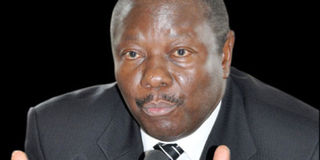Delay in harmonising regional laws affecting mineral exports - expert

Mr Kabagambe Kaliisa, the Permanent Secretary, Ministry of Energy
Kampala- The slow pace at which regional countries are harmonising laws regarding minerals continues to affect exports, the director of democracy and good governance programme at International Conference on the Great Lakes Region (ICGLR) Secretariat, has said.
Citing the Democratic Republic of Congo example, Mr Ambeyi Ligabo said minerals from the Great Lakes Region (GLR) have been associated with armed groups which put exports from the region in jeopardy because of a pending ban on all minerals from the area. “That was how ICGRL was created as one of the tools to help in authenticating minerals by ensuring that the mining companies are not led by armed groups.
One way of improving trading across borders is for member governments to harmonise their laws so that it can become easier for a trader in Uganda to buy gold in Congo and sell it in Rwanda.
“But there is a slow pace between member countries and at the moment, if a person buys a mineral from Congo in Uganda, he/she will be arrested,” Mr Ligabo explained.
Mr Ligabo made the comments during the opening of the ninth ICGRL on behalf of the conference executive secretary in Kampala early in the week. He also observed that failure to harmonise is partly due to lack of trust among the 12 member states and different stakeholders.
“There is a lot of corruption in minerals. From mining to selling the finished products, people do not follow legislation. But if the system is improved, it will lessen the lack of confidence and we shall market our products legally,” he added.
In response, Mr Kabagambe Kaliisa, the permanent secretary ministry of Energy, said Uganda is in advanced stages of harmonising the national laws with ICGLR model law to aid in its protocol against illegal exploitation of tin, tantalum, tungsten and gold, the four conflict minerals.




